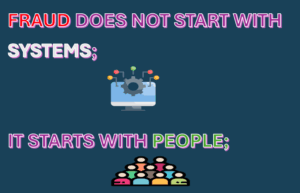By Enock YEBOAH-MENSAH
In this exclusive interview, a reputable business and finance newspaper sits down with Theorhema, CEO of Apogee Bank, to explore the meteoric rise in employee-related fraud in Ghana’s Banking Sector.
With candid reflection and strategic depth, Theorhema puts a fresh lens on the issue; one not only rooted in risk and control but also in humanity and leadership.
Journalist: Quite recently, we have seen a surge in employee-related fraud cases across several banks. In your view, what is really driving this trend?
Theorhema: Let us stop pretending fraud happens in a vacuum. It does not begin with failing systems nor controls; it begins with failing people. What we are seeing is the consequence of poor employee welfare across the industry.
I always return to Donald Cressey’s Fraud Triangle. It outlines three conditions necessary for fraud: pressure, opportunity and rationalization. Poor employee welfare fuels the flame for each one.
Journalist: How exactly does poor welfare feed into all three parts of the Triangle?
Theorhema: It is very clear.
Pressure (or Incentive) “Pressure is usually financial; it entails amongst many things; employees struggling to support families, pay rent or cover medical bills. When salaries stagnate whiles the cost of living soars, pressure becomes unbearable.”
This is the starting point for most internal fraud cases. In the Banking Sector, employees often manage large sums of money but may themselves live paycheck to paycheck. Financial pressure could stem from:
- Rising inflation: Essential items like food, transport and rent become more expensive whereas salaries remain unchanged.
- Family obligations: Employees supporting extended families or dealing with school fees, sick relatives, or emergencies may feel trapped.
- Lifestyle inflation: Especially in corporate environments, there is subtle pressure to “look the part.” The cost of maintaining such appearances can be unbearable.
- Loan overhangs: Some staff take on multiple loans, formal or informal, to survive or fund basic needs.
Over time, this pressure turns into desperation. And when no institutional support (e.g., welfare schemes, mental health access, hardship allowances) is available, the temptation to “solve” financial problems unethically increases.
Opportunity “Opportunity arises when controls exist on paper but not in spirit. Demoralized or disengaged staff are less likely to uphold systems. Worse, they may actively collude to override them.” Even with seemingly robust internal controls, human behavior is the weak link. Here is how opportunity creeps in:
- Control fatigue: If staff see controls as bureaucratic rather than meaningful, they find ways to bypass them.
- Lack of oversight: Understaffed audit functions, poor segregation of duties or overreliance on a single individual can open loopholes.
- Demoralization: When employees feel exploited or unfairly treated, they lose their sense of loyalty and ethics.
- Collusion: Fraud rarely happens in isolation. One weak link can recruit others and once collusion starts, even strong controls can be defeated.
- Tech loopholes: In a digital banking environment, poorly monitored system accesses and insufficient reconciliation processes can offer silent gaps for abuse.
Rationalization
“Employees begin telling themselves, ‘After all I have done, this bank owes me.’ That is how ethics are quietly traded for self-justification.” This is the psychological green light, the internal “permission” employees give themselves. Common rationalizations include:
- “They underpay me”, The belief that their compensation does not match their effort nor the Bank’s profits.
- “They waste more than I have taken”, Comparing one’s theft to perceived inefficiencies or lavish spending by leadership.
- “I will pay it back”, Self-delusion that the fraud is just a temporary fix.
- “No one cares about us anyway”, Feeling invisible or unappreciated breeds detachment from values and institutional loyalty.
Once rationalization sets in, fraud is no longer seen as a crime – it is seen as justice, compensation or even survival.
Journalist: You have criticized the tendency to prioritize efficiency over people. Could you explain?
Theorhema: We have fallen into the trap of worshipping profitability metrics, cutting headcount, automating processes and outsourcing support functions, without thinking about the psychological cost. But efficiency without empathy creates cracks. At Apogee Bank, we take a different route.
We implement welfare policies that do not just look good; they serve a strategic purpose. Staff who feel valued rarely compromise the institution they serve. That is our insurance policy against internal fraud.
Journalist: What can the Central Bank do to help address this?
Theorhema: The Regulator has a far greater role to play in addressing employee-related fraud than merely encouraging the enforcement of a more rigorous internal control.
Improvement in internal control is critical but people risk is even more dangerous and often insidious. It is time the Central Bank began measuring human-centered indicators with the same rigour it applies to financial performance.
For instance, staff attrition metrics should be a standard supervisory concern. If a bank is experiencing high turnover especially in sensitive units like Risk, Compliance and Operations, that could be a red flag and should raise concern for investigation.
These are functions that safeguard integrity. Constant staff exits, in general, may suggest low morale, burnouts or toxic leadership.
Additionally, the Regulator should monitor the Revenue-to-Personnel-cost ratio across institutions. When profits rise sharply but employees’ welfare stagnate or decline, it may suggest exploitation not efficiency.
Such imbalances eventually manifest in disengagement, corner-cutting or even internal fraud.
It is also time to introduce industry-wide benchmarks for measuring employee satisfaction and workplace abuse. Just as we track Non-Performing Loans or Capital Adequacy ratios, we must now track how banks treat their people.
Anonymous climate surveys, whistle-blower complaint statistics and HR policy audits should inform supervisory dashboards.
When employees feel respected, safe and fairly treated, they are less likely to rationalize unethical behavior. That is not just a human resource insight, it is a governance imperative.
The Central Bank must extend its oversight beyond the Balance Sheet to include welfare audits, employee union formation and protections, whistle-blower channels and consequences for abusive management practices.
Staff dignity and depositor protection are invariably linked. By integrating human capital metrics into its regulatory framework, the Central Bank will not just record lower fraud cases but also this will help foster a healthier, more sustainable financial ecosystem rooted in trust, accountability and shared prosperity.
Journalist: That is a bold shift in how we think about regulation.
Theorhema: Absolutely! The traditional approach to banking regulation, one that focuses almost exclusively on liquidity, capital adequacy and risk-weighted assets, is no longer sufficient.
Human welfare has long been dismissed as a “soft issue” but in truth, it is a core risk factor. Disengaged, overworked or underpaid employees are more prone to engage in unethical behaviour, collusion and internal fraud.
This makes employee welfare not just an HR concern but a critical governance and compliance issue. When the regulatory framework ignores how institutions treat their people, it leaves a major vulnerability unchecked.
It is time the Central Bank’s lens expanded to reflect this reality. A modern, resilient banking system must be built not only on strong capital but also on a culture of fairness, dignity and engagement. By treating human welfare as a governance issue, the Regulator can drive systemic change, one that protects both depositors’ funds and the long-term health of the Banking industry.
Journalist: Any final message to the industry?
Theorhema: “Yes, treat your people well”. Not because it is nice but rather it is smart risk management. Banking is built on trust, and trust begins with how we treat those inside our walls. If we want to protect depositors’ funds and institutional reputation, we must do more than monitor numbers; we must monitor hearts, minds and morale.
The author is a Strategy, Leadership & Finance Enthusiast,
Email: [email protected]











